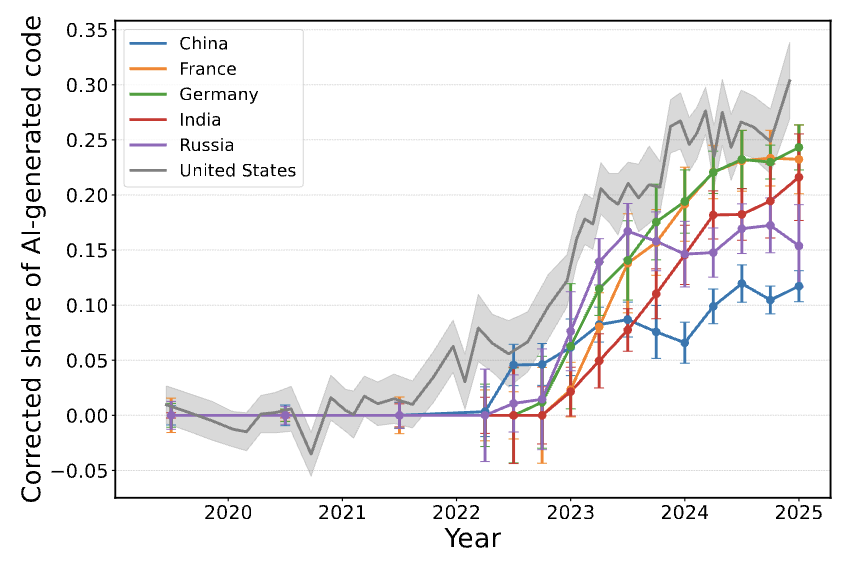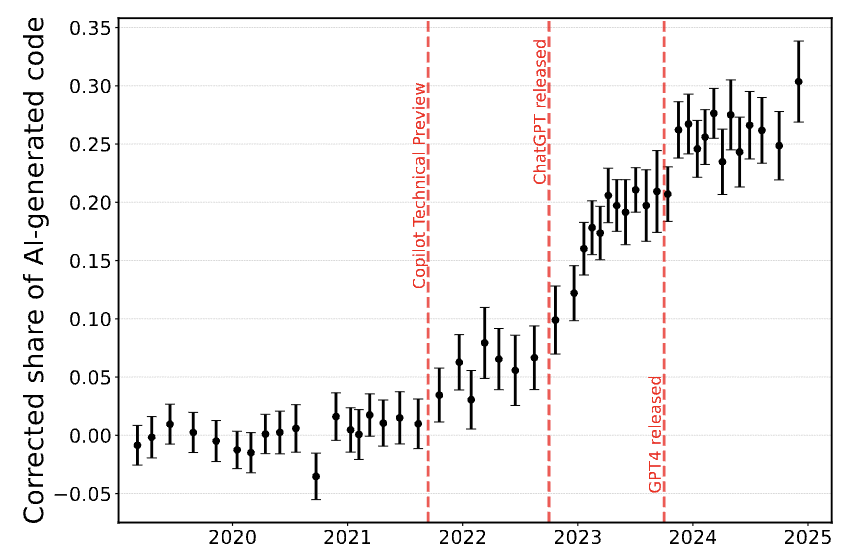
Johannes Wachs
@johannes_wachs
Researching social computing, crowds, and networks @uni_corvinus, @mtakti_iehas/@AnetiLabs.
How much code now comes from AI? In new work with @simone_daniotti, @xiangnan_feng & @FrankNeffke we estimate that by end-2024 about 30% of Python functions pushed by US devs on GitHub are AI- generated. Adoption is rapid but diffusion lags globally. How did we do it?



🚀Looking for a Manager or Associate Director to help launch EconTAI at @UVA - a new initiative on the transformative economic implications of advanced AI. Looking for someone passionate about AI & shaping the future. Please apply, RT or tag someone perfect for this role!🎯
I was one of the 16 devs in this study. I wanted to speak on my opinions about the causes and mitigation strategies for dev slowdown. I'll say as a "why listen to you?" hook that I experienced a -38% AI-speedup on my assigned issues. I think transparency helps the community.
We ran a randomized controlled trial to see how much AI coding tools speed up experienced open-source developers. The results surprised us: Developers thought they were 20% faster with AI tools, but they were actually 19% slower when they had access to AI than when they didn't.
AI už píše třetinu kódu. A to jsme teprve na začátku. Nástroje generativní AI jsou mezi vývojáři čím dál populárnější. To víme. Ale jak moc se vlastně už dnes zapojují do reálné práce? Kolik kódu už dnes není „lidská práce“ v tradičním smyslu? A co to dělá s produktivitou,…
Do you have what it takes to forecast International trade? Today, we are launching AI4trade, a global challenge where teams compete for cash prizes by submitting their best trade forecasts. But it comes with a couple of twists: 1. This is a future out-of-sample challenge, so…
There used to be two sources of traffic on the web: search and social. Social disappeared as social networks mutated into TV channels and discouraged links. Now search is on the decline because of AI. AI is swallowing search traffic, but it is different from search in one…
🚨The big upward trend in Generative AI/LLM tool use in 2025 continues but may be slowing. An update to our paper "The Labor Market Effects of Generative AI" tracking LLM adoption w surveys (finding LLM use at work went from 30.1% [December 2024] to 45.6% [June 2025]). Thread🧵
New Gen AI paper🚨: "The Labor Market Effects of Generative Artificial Intelligence" with Filip Jolevski (@FilipJole), Vitor Melo (@MeloVitor_), and Brendan Moore (@BrendanDMoore). papers.ssrn.com/sol3/papers.cf…
Paper bastante interessante. Segundo os autores cerca de 30% de todo código submetido no GitHub atualmente por devs americanos é gerado por IA. De longe o pais que mais utiliza. Aparentemente existe um ganho de produtividade significativo. arxiv.org/abs/2506.08945
NEW PAPER: The Theory of Economic Complexity The Economic Complexity Index or ECI is a widely used empirical tool with an unclear theoretical basis. In this paper, we change that by formally deriving ECI for several production functions and showing what it really does. In a…
Who is using AI and how much? marginalrevolution.com/marginalrevolu…
What is the geography of your academic impact? rankless.org/countries/chl Today @endremborza released new maps in Rankless. Explore the origin of citations for 3.8M+ scholars, 29k+ institutions, & 100s of countries. Try them & let us know what should be our next feature.
Interesting paper from @simone_daniotti, @johannes_wachs, @xiangnan_feng, and @FrankNeffke. “By December 2024, AI wrote an estimated 30.1% of Python functions from U.S. contributors, versus 24.3% in Germany, 23.2% in France, 21.6% in India, 15.4% in Russia and 11.7% in China.…
Are we limiting AI by making it too human? James Evans (@profjamesevans), Faculty Co-Director of the Complementary AI research initiative, shares how current AI models risk narrowing scientific exploration, and how we can build better AI, on the latest episode of @BigBrainsUC!
What if the future of science isn’t human? @UChicago sociologist @ProfJamesEvans is building AI systems that don’t just think like us, but think beyond us. Listen: ms.spr.ly/6016SSKWa
Lots of interesting stuff in this paper, plus, as of the end of 2024: “the annual value of AI-assisted coding in the United States at $9.6−14.4 billion, rising to 64−96 billion if we assume higher estimates of productivity effects reported by randomized control trials”
How much code now comes from AI? In new work with @simone_daniotti, @xiangnan_feng & @FrankNeffke we estimate that by end-2024 about 30% of Python functions pushed by US devs on GitHub are AI- generated. Adoption is rapid but diffusion lags globally. How did we do it?
Just out in Silicon Continent: Europe's big disadvantage in generating clusters or colocating any industry (or a top University!) with large economies of scale: without ways to have gains flow back to all states, Europe cannot do comparative advantage! siliconcontinent.com/p/should-every…
Very cool!
How much code now comes from AI? In new work with @simone_daniotti, @xiangnan_feng & @FrankNeffke we estimate that by end-2024 about 30% of Python functions pushed by US devs on GitHub are AI- generated. Adoption is rapid but diffusion lags globally. How did we do it?
Very interesting trends on how much code is increasingly being written by Generative AI tools
How much code now comes from AI? In new work with @simone_daniotti, @xiangnan_feng & @FrankNeffke we estimate that by end-2024 about 30% of Python functions pushed by US devs on GitHub are AI- generated. Adoption is rapid but diffusion lags globally. How did we do it?